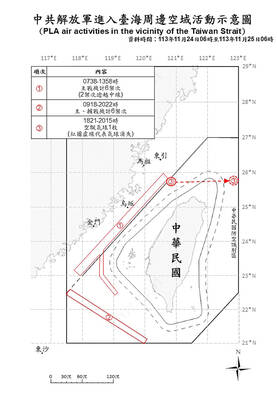An exhibition of formerly classified records and artworks depicting the use of torture during the White Terror era has opened at the Tsai Jui-yueh Dance Research Institute/Rose Historic Site (蔡瑞月舞蹈社/玫瑰古蹟) in Taipei.
Dialogues With the Past, Present and Future (彼時影‧未來光), organized by the Transitional Justice Commission, opened on Friday last week and runs through July 26.
Through its review of military court files from the White Terror era, when many people who opposed the then-Chinese Nationalist Party (KMT) authoritarian government were tried by military, rather than civilian courts, the commission learned that many victims were kept under surveillance, and in many cases authorities had used torture to extract confessions, commission member Chen Yu-fan (陳雨凡) said on Tuesday.

Photo: Chen Yu-fu, Taipei Times
Several works by artist Ouyang Chien-hua (歐陽劍華), a White Terror victim, depict torture methods used during that time, Chen said.
Ouyang, then a school principal on Kinmen, was arrested and imprisoned after being reported for saying that “if Chiang Kai-shek (蔣介石) was so great, he would not have lost” the Chinese Civil War to the Chinese Communist Party.
While in prison, Ouyang made a record of torture methods used on other inmates, including the pulling of fingernails, water torture, being forced into a cramped position for long periods, and after his release he used those records to highlight the torture and abuse, Chen said.
One piece depicts a pregnant woman who was jailed on political charges and suffered a miscarriage after being beaten during her incarceration, he said.
One man was beaten and forced to consume a huge quantity of salt before being sent back to his cell, where the only water he could get was from the cell’s toilet, Ouyang wrote.
Chen said another painting depicts a man who bit off his own tongue in a bid to commit suicide.
Judges would ask police and public security officials if defendants’ confessions had been extracted through torture, and would routinely be told “no,” but the lack of any investigations showed how broken the judiciary was during the Martial Law era, she said.
Also included in the exhibition are surveillance records on pro-democracy advocate Lin I-hsiung (林義雄) from around the time his mother and twin daughters were murdered in the family home in Taipei on Feb. 28, 1980, and a third daughter left badly wounded.
The research institute is the rebuilt Japanese-style building on the site of Taiwanese modern dance pioneer and human rights activist Tsai Jui-yueh’s (蔡瑞月) China Dance Club.
Tsai was jailed for three years on Green Island as a political prisoner.
Since her death in 2005, the foundation and the Rose Historic Site have played a prominent role in promoting Taiwan’s human rights movement.

A decision to describe a Chinese Ministry of Foreign Affairs statement on Singapore’s Taiwan policy as “erroneous” was made because the city-state has its own “one China policy” and has not followed Beijing’s “one China principle,” Deputy Minister of Foreign Affairs Tien Chung-kwang (田中光) said yesterday. It has been a longstanding practice for the People’s Republic of China (PRC) to speak on other countries’ behalf concerning Taiwan, Tien said. The latest example was a statement issued by the PRC after a meeting between Singaporean Prime Minister Lawrence Wong (黃循財) and Chinese President Xi Jinping (習近平) on the sidelines of the APEC summit

Taiwan’s passport ranked 34th in the world, with access to 141 visa-free destinations, according to the latest update to the Henley Passport Index released today. The index put together by Henley & Partners ranks 199 passports globally based on the number of destinations holders can access without a visa out of 227, and is updated monthly. The 141 visa-free destinations for Taiwanese passport holders are a slight decrease from last year, when holders had access to 145 destinations. Botswana and Columbia are among the countries that have recently ended visa-free status for Taiwanese after “bowing to pressure from the Chinese government,” the Ministry

HEALTHCARE: Following a 2022 Constitutional Court ruling, Taiwanese traveling overseas for six months would no longer be able to suspend their insurance Measures allowing people to suspend National Health Insurance (NHI) services if they plan to leave the country for six months would be abolished starting Dec. 23, NHIA Director-General Shih Chung-liang (石崇良) said yesterday. The decision followed the Constitutional Court’s ruling in 2022 that the regulation was unconstitutional and that it would invalidate the regulation automatically unless the NHIA amended it to conform with the Constitution. The agency would amend the regulations to remove the articles and sections that allow the suspension of NHI services, and also introduce provisional clauses for those who suspended their NHI services before Dec. 23, Shih said. According to

‘GRAY ZONE’ TACTICS: China continues to build up its military capacity while regularly deploying jets and warships around Taiwan, with the latest balloon spotted on Sunday The US is drawing up contingency plans for military deployments in Japan and the Philippines in case of a Taiwan emergency, Japan’s Kyodo news agency reported. They would be incorporated in a first joint operation plan to be formulated in December, Kyodo reported late on Sunday, citing sources familiar with Japan-US relations. A US Marine Corps regiment that possesses High Mobility Artillery Rocket Systems — a light multiple rocket launcher — would be deployed along the Nansei Island chain stretching from Kyushu to Yonaguni near Taiwan, Kyodo said. According to US military guidelines for dispatching marines in small formations to several locations,